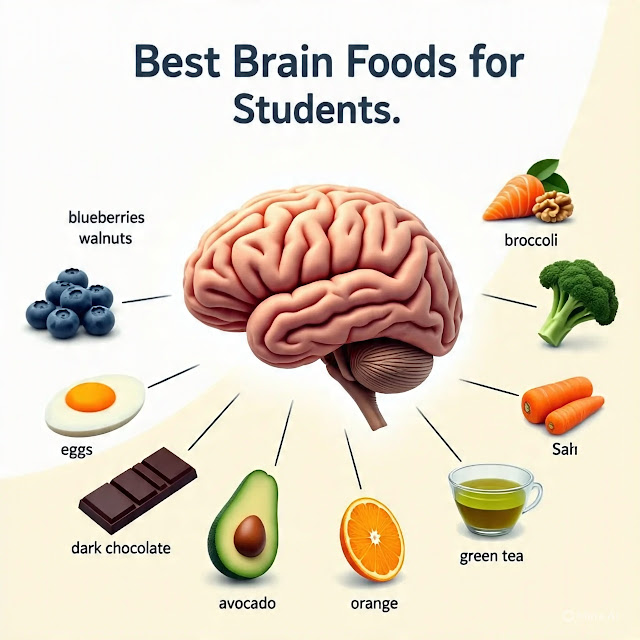Best Brain Foods for Students
🧠 Best Brain Foods for Students
Boost Memory, Focus & Brainpower Naturally
When it comes to excelling in academics, most students focus on creating study schedules, reducing distractions, and practicing mindfulness. But there’s one powerful area many overlook: nutrition for the brain. What you eat has a direct impact on your memory, mental clarity, and ability to focus.
Think of your brain as a high-performance machine—it needs quality fuel to run efficiently. In this post, we’ll explore 10 powerful brain-boosting foods that can help students sharpen their minds, stay alert during long study sessions, and retain more of what they learn.
🫐 1. Blueberries – Nature’s Brain Candy
In fact, studies suggest that regular consumption of blueberries can help delay brain aging by up to 2.5 years.
How to eat: Add them to smoothies, oatmeal, or yogurt—or just snack on a handful.
🥜 2. Walnuts – The Brain-Shaped Supernut
Fun fact: Walnuts actually resemble the human brain—and for good reason!
How to eat: A small handful per day is enough. Add to salads, desserts, or eat as-is.
🥦 3. Broccoli – The Green Brain Guard
Additionally, broccoli contains compounds that support anti-inflammatory processes, keeping your mind clear and sharp.
How to eat: Steam it, stir-fry it, or blend it into soups and green smoothies.
🥚 4. Eggs – The Choline Champions
Eggs also contain vitamin B12 and protein, both of which are necessary for energy production and brain function.
How to eat: Boiled, scrambled, poached, or as an omelet—easy and versatile!
🐟 5. Fatty Fish – Brain's Best Friend
Low levels of omega-3s have been linked to increased risk of learning difficulties, depression, and even ADHD.
How to eat: Grilled salmon, fish curry, or sardine toast are delicious ways to incorporate fatty fish into your diet.
🍫 6. Dark Chocolate – A Sweet Brain Booster
Choose dark chocolate with at least 70% cocoa content for maximum benefits.
How to eat: A small square after meals or melted into hot milk for a brain-boosting drink.
🥑 7. Avocados – Healthy Fats for Sharp Thinking
They also contain vitamin E, which protects brain cells from oxidative stress.
How to eat: Spread on toast, add to salads, or blend into smoothies.
🍊 8. Oranges – The Vitamin C Powerhouse
Vitamin C also plays a role in reducing anxiety and fatigue, making it perfect during exams.
How to eat: Fresh orange juice, fruit salads, or just peel and eat.
🥤 9. Green Tea – Calm Focus in a Cup
This combo helps students stay calm yet sharp—perfect for long study sessions.
How to drink: Brew 1-2 cups a day. Add lemon or honey for flavor.
🥕 10. Carrots – Crunchy Brain Fuel
Eating carrots regularly can support brain longevity and reduce mental fatigue.
How to eat: Eat raw with hummus, shred into salads, or cook in soups and stir-fries.
✅ Final Thoughts: Feed Your Brain to Fuel Your Success
If you’re a student looking to boost your academic performance, don’t underestimate the power of a good diet. While study techniques, sleep, and time management are vital, the foods you eat have a direct influence on how effectively your brain works.
Recap of the Top Brain Foods:
-
🫐 Blueberries – for memory and anti-aging
-
🥜 Walnuts – for DHA and better thinking
-
🥦 Broccoli – for cognitive protection
-
🥚 Eggs – for memory and mood
-
🐟 Fatty Fish – for brain structure
-
🍫 Dark Chocolate – for energy and focus
-
🥑 Avocados – for oxygen-rich blood flow
-
🍊 Oranges – for Vitamin C and brain defense
-
🥤 Green Tea – for calm alertness
-
🥕 Carrots – for long-term memory
🫐 Blueberries – for memory and anti-aging
🥜 Walnuts – for DHA and better thinking
🥦 Broccoli – for cognitive protection
🥚 Eggs – for memory and mood
🐟 Fatty Fish – for brain structure
🍫 Dark Chocolate – for energy and focus
🥑 Avocados – for oxygen-rich blood flow
🍊 Oranges – for Vitamin C and brain defense
🥤 Green Tea – for calm alertness
🥕 Carrots – for long-term memory
Incorporate these into your daily meals, even in small portions, and over time you’ll notice better concentration, more stable energy, and improved academic performance.
📝 Pro Tip:
Combine multiple brain foods into a study snack bowl—like blueberries, walnuts, and dark chocolate—or make a healthy breakfast with eggs, avocado toast, and green tea. Delicious and effective!

.jpeg)



Comments
Post a Comment